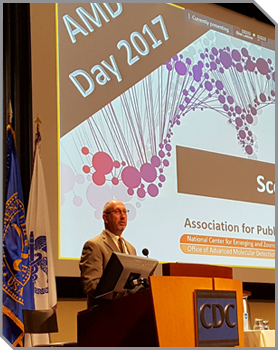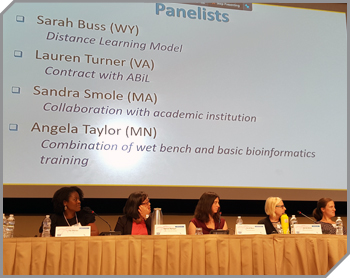Advanced Molecular Detection (AMD): the Power of Innovation and Partnerships to Advance Public Health

APHL Executive Director Scott Becker highlights the value of AMD in state & local labs
More than 400 external partners and CDC staff gathered in Atlanta as CDC and the Association of Public Health Laboratories (APHL) hosted the fourth annual AMD Day 2017 on September 25 and 26. The event expanded to 2 days in order to cover all of the science. AMD combines powerful technologies (DNA sequencing and advanced computing) to solve complex infectious disease mysteries, ultimately saving lives and reducing costs. Since CDC’s Office of Advanced Molecular Detection was established in 2014, AMD has played a pivotal role in many areas of public health including
- identifying the genetic makeup of Ebola and Zika during each of those outbreaks
- solving foodborne outbreaks involving Listeria infection faster by linking food sources to clusters of illness
AMD Day brought together laboratory scientists, bioinformatics experts, and infectious disease epidemiologists to meet and discuss their success, challenges and future plans for the transformation of public health practice through AMD. The event featured remarks from CDC director Dr. Brenda Fitzgerald and APHL Executive Director Scott Becker. Staff from APHL, the Association of State and Territorial Health Officials, the American Society of Microbiology, the Council of State and Territorial Epidemiologists, biotechnology companies, as well as 60 participants from state and local health departments participated and enjoyed a robust program that ranged from the scientific to the programmatic, including
- a keynote address on the history of sequencing technologies as well as current trends in the industry
- interactive demonstrations, including a presentation on data visualization
- a panel presentation focusing on developing the public health workforce
- a panel describing the value of translating AMD science and successes for the public
In the next 3-5 years, AMD will continue to harness the power of next-generation sequencing and other technologies to address infectious disease threats. Specifically, AMD will help scientists
- prepare for future public health emergencies and emerging infectious diseases, as AMD did for Ebola virus and Zika virus
- continue the roll-out of technology to states and take measures to keep states up-to-date with rapidly evolving AMD technologies
- integrate genomic data with epidemiologic data to optimize public health impact
- continue the ramp-up of workforce transformation

Public health lab staff from Wyoming, Virginia, Massachusetts & Minnesota provide state perspectives on AMD and workforce development
Next-generation sequencing and related technologies continue to advance at an astounding pace giving us new and expanded tools to detect disease faster, identify outbreaks sooner and protect people from emerging and evolving disease threats. To be successful and use these technologies to stay ahead of the next infectious disease threat, all levels of the public health system need to work together with AMD. AMD Day provided a unique opportunity for our partners to gather, learn and explore new and additional ways to collaborate in this rapidly changing field.